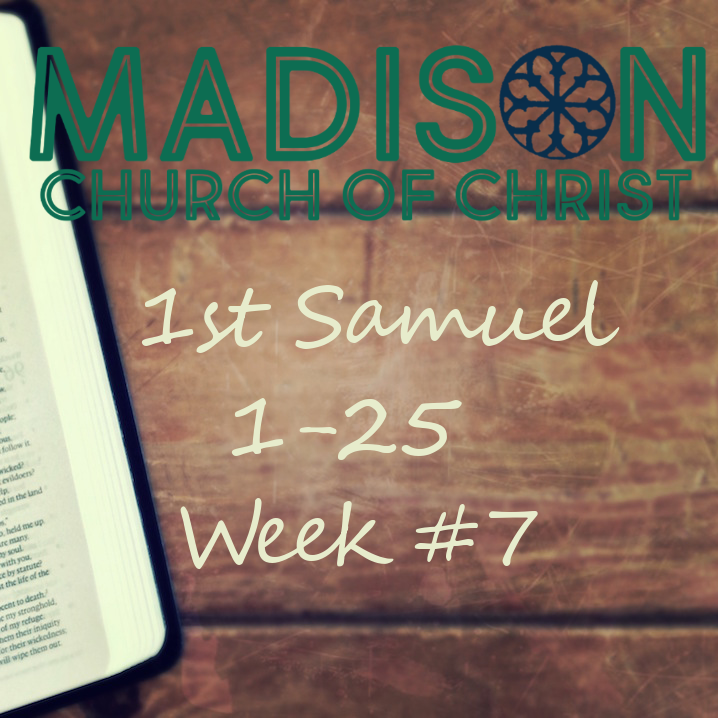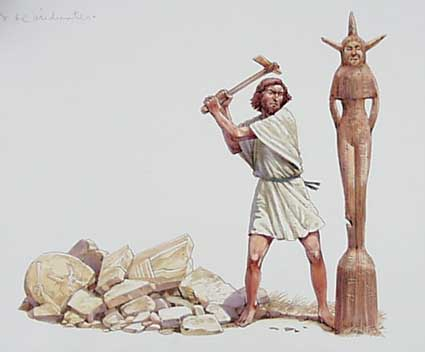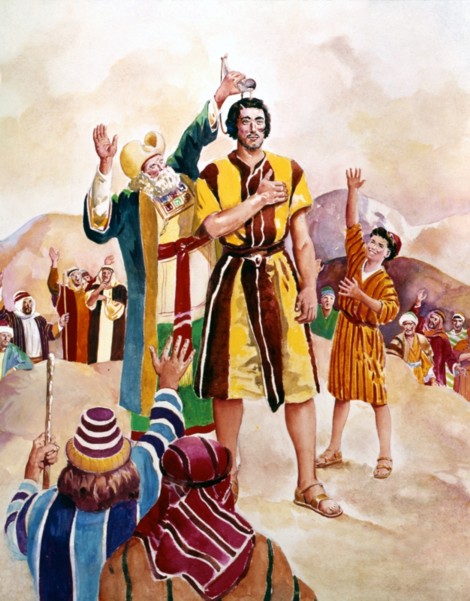Week 7 Study Page - 1st Samuel 1-25
Week #7 Study Page
1st Samuel 1-25
Sunday: 1st Samuel 1-4
Monday: 1st Samuel 5-8
Tuesday: 1st Samuel 9-12
Wednesday: 1st Samuel 13-15
Thursday: 1st Samuel 16-18
Friday: 1st Samuel 19-22
Saturday: 1st Samuel 23-25
Degree of difficulty: 4 out of 10 (Explanation:) 1st Samuel is a book filled with narrative and characters that you have likely known of since your youth. It is really fun to read the whole stories of these characters that you may remember from Sunday school flannelgraphs. like most of the stories in the Old Testament there will be many places and towns named that may seem unfamiliar, thus a map will come in handy. The good news is that most of the story of 1st Samuel occurs in the southern portion of Israel, and the primary opponent of the characters in these stories are the Philistines, who reside directly to the west of Judea, so our map can really be focused in on that area. the timelines of these characters overlap in difficult ways. keep in mind that a king can be anointed, but not yet take the throne. Both Saul and David, after their anointing as king, return to work in their fathers' fields or pastures respectively.
About the Book
1st Samuel
Date of Authorship: The books of 1st and 2nd Samuel are really one, continuous, historical volume. They contain textual clues about certain territories that remain in Israel's possession "to this day" (i.e. 1st Samuel 27:6) which indicates that the volume was written after (not contemporaneously with) the historical events recorded. Because the author often refers to Judah and Israel as separate territories/places (11:8; 17:52; 18:16) we conclude that it was written after the divided monarchy in 931 BC. Also, because there is no indication of or reference to the exile of Israel (northern tribes) in 721 BC we can assume it was written before then.
Author: The Jewish Talmud records that Samuel wrote 1st Samuel. However, this book does include the account of his death and events that occurred afterward, so that position is untenable. The Bible gives us no real clues about who wrote the accounts of 1st and 2nd Samuel.
Purpose: 1st Samuel explains to its Israelite audience how it is that they came to have a king. Furthermore, it shows them the qualities possessed by a bad king (Saul) and the qualities possessed by a good king (David). This document would serve a narratival validation of the Davidic monarchy for its readers in the kingdom of Judah.
As you read Notes
The Promised Land
God had promised a huge portion of land to the Israelites in what we call the Levant or the fertile crescent. Israel was unsuccessful in completely overtaking and possessing all of this land on their initial invasion of the region and that situation only regressed during the period of the Judges, as Israel's unfaithfulness repeatedly resulted in defeat and invasion.
When Saul came to power in 1st Samuel, the primary region of the Promised Land which remained outside of Israelite control was the western portion along the Mediterranean coast. Additionally, some in-land cities such as Jerusalem, quite near the Dead Sea, remained in enemy hands. The most pressing threat to the Israelites, at this time, was the Philistines to the Southwest. Not only did they possess a large portion of land that God had promised to Israel, but they were pressing East and North further into Israelite territory.
One problem that the Israelites encountered in 1st Samuel is that all or most of the skilled metalworkers were in Philistia and Israel could not produce or procure weapons with which to wage war.
We're used to thinking of Jerusalem as the capital or primary city in Israel. But during this time, Jerusalem was still occupied by the Jebusites(Canaanites). The religious and cultural center of Israel at this time was Shiloh, where Eli resides and where the Tabernacle is, in chapter 1 (Shiloh is not on this map but it is between Ophrah and Schechem about where that little white box is). Gibeah will essentially become the capital when Saul comes to power because that is his hometown.
1st Samuel 2: Hophni and Phinehas
Eli's sons were evil, and this chapter is devoted to telling us how bad they were. One of the charges levied against them is that they would "sleep with the women who served at the entrance of the tent of meeting" (2:22). This practice was immoral not only as a matter of sexual impropriety but because such a practice was a hallmark of pagan idolatry especially the worship of the goddess Asherah (more on her below).
The primary charge against Hophni and Phinehas was their mistreatment of the offering given to the Lord in the temple. From these burnt offerings the priests (Eli, Hophni, and Phinehas among them) were allowed to take a particular share. These rules are outlined in Leviticus - which we skipped - so here they are below:
The priest shall burn them on the altar as a food offering, a pleasing aroma. All the fat is the Lord’s. (Lev. 3:16)
Anyone who eats the fat of an animal from which a food offering may be presented to the Lord must be cut off from their people. (Lev. 7:25)
The Lord said to Moses, “Say to the Israelites: ‘Anyone who brings a fellowship offering to the Lord is to bring part of it as their sacrifice to the Lord. With their own hands they are to present the food offering to the Lord; they are to bring the fat, together with the breast, and wave the breast before the Lord as a wave offering. The priest shall burn the fat on the altar, but the breast belongs to Aaron and his sons. You are to give the right thigh of your fellowship offerings to the priest as a contribution. The son of Aaron who offers the blood and the fat of the fellowship offering shall have the right thigh as his share. From the fellowship offerings of the Israelites, I have taken the breast that is waved and the thigh that is presented and have given them to Aaron the priest and his sons as their perpetual share from the Israelites.’” (Lev 7:30-34)
The Traveling Ark
Shiloh was the home of the Mishkan (Tabernacle) for 369 years. After losing a battle to the Philistines, the Children of Israel took the Ark of the Covenant from the Mishkan in Shiloh to the battlefield, hoping that the Ark’s presence would protect them (I Samuel 4:3-4).
Even Ha-Ezer is where the Israelites set up camp for their battle against the Philistines (I Samuel 4:1). The Ark is brought from Shiloh to Even Ha-Ezer, where it is captured (I Samuel 4:11).
After defeating the Israelites and capturing the Ark, the Philistines bring the Ark from Even Ha-Ezer to the Philistine city of Ashdod, where they place it in the temple of their god, Dagon (I Samuel 5:1-2). As a result, the statue of Dagon collapses and God sends a plague upon the people of Ashdod (I Samuel 5:3-7).
The Ark is moved from Ashdod to the Philistine city of Gat (I Samuel 5:8), where the people of Gat also suffer from the godly plague (I Samuel 5:9).
From Gat, the Ark is brought to the Philistine city of Ekron. The people of Ekron also suffer and demand that the Ark be sent back to Israel (I Samuel 5:10-11).
Fearing death, the Philistines send the Ark back to the Israelite city of Bet Shemesh (I Samuel 6:11-12). The people of Bet Shemesh rejoice over the Ark but are punished for gazing at it (I Samuel 6:19-21).
The people of Bet Shemesh send for the inhabitants of Kiryat Ye’arim to take the Ark. It is brought to the house of Avinadav in Kiryat Ye’arim where it remains for 20 years (I Samuel 6:21-7:2).
note here: I don't think that the Ark only resided in Kiryat Ye'arim for 20 years. the Ark was returned there before the reign of Saul, Saul reigned for 42 years, and the next time it moves is years into the reign of David. here is one theory on what the "20 years" means in 7:2. from Joshua Meadowcroft.
"The following is another theory from 1 Sam 7:2-3 about the journey of the Ark. The theory is that “the 20 years didn’t end with David bringing the ark back to Jerusalem but rather before Samuel spoke against the idolatry of the Israelites in the next verse. In the Kiel and Delitzsch Commentary on the Old Testament, the verse is read as: ‘And it came to pass, when the days multiplied from the time that the ark remained at Kiriath-Jearim, and grew to twenty years, and the whole house of Israel mourned after Jehovah, that Samuel said …’ They explain it this way: ‘The single clause of 1 Sam 7:2 and 1 Sam 7:3 are connected together by a vav consec., and are not to be separated from one another. There is no gap between these verses, but they contain the same closely and logically connected thought…’ The letter vav is often times translated as ‘and’. In the NASB it says, ‘Then Samuel spoke …’ indicating that he spoke after the events in verse 2. So it was twenty years that the Israelites continued in their sin after the ark was returned. They then lamented their predicament, then Samuel spoke.”
After capturing the city of Jerusalem from the Jebusites, King David establishes it as the political and spiritual capital of his kingdom. He sends for the Ark at the house of Avinadav in Kiryat Ye’arim. Though it is placed in the home of Oved Edom the Gittite for three months, it eventually reaches its ultimate destination (II Samuel 6:2-17)
1st Samuel 7:3 - Ashtoreths / Asherah
In Judges, we read that the Israelites were practicing Idolatry, and in the study notes, we examined the Canaanite God Baal. in 1st Samuel 7, when Samuel leads reform in Israel, he mentions two objects of worship that the Israelites had to rid themselves of. The first is Baal, who we've already discussed, and the second is the "Ashtoreths." Ashtoreths were poles erected in high places and places of cultic worship throughout Canaan that represented the mother -goddess Asherah. The Bible calls her "the goddess of the Sidonians in 1st Kings 11:5.
Asherah is present in Sumerian and Ugaritic texts where she is depicted as the consort of the primary deity (Anu in the Sumerian pantheon and El in the Ugaritic). worship of this goddess would center around a pole that would likely have been chiseled to show her likeness as depicted in this artist's rendering of an Israelite about to cut down an Asherah pole. We know that, in Isreal, these poles were constructed from wood because of passages like Judges 6:26 and Deuteronomy 12:3. the worship of Asherah often involved the practice of prostitution as indicated by passages like Deuteronomy 23:17-18 and 1st King 14:22-24. Despite the fact that the Israelites complied with Samuel's demands here in chapter 7, Israel would sadly return again and again to the worship of Asherah and the wooden poles crafted in her image.
1st Samuel 8-12: an Israelite King
The chaotic drama of Judges bleeds over into 1st Samuel. After this book introduces us to Samuel, the opening scene is the Ark of the Covenant being captured by the Philistines - a truly in devastating event for Israel. The Israelites have had enough - they want a king.
Unlike the judges, who were primarily tribal and regional leaders, a king could presumably rally or call to war all over Israel. Also, the king could exercise authority in demanding nationwide faithfulness to Yahweh and punishing Idolatry - which is the antidote to the repeated phrase in Judges, "Everyone did as they saw fit." Unfortunately, the Israelite kings were often far more concerned with the former than the latter and ended up failing in both regards.
Judges 8-12 is the drama of the selection of the first Israelite king, beginning with the people asking for one, and ending with Samuel stepping down as the judge of the Israelite people. Despite the fact that the Israelites wanted a king "like all the other nations have" (8:5), The position of the Israelite king was markedly different than the kings of that time in the societies that neighbored the Israelites. In other ancient societies, the king was often an extension of the deity or the medium through which the deity's will was accomplished. However, in this episode, especially in Samuel's farewell, it becomes clear that the Israelite king is neither of those. The King in Israel was not to be autonomous in his authority and power; rather he was to be subject to the Law of the Lord and the word of the prophet (10:25, 12:14-15). The Israelite king was an extension or representative of the Israelite people and their* covenant faithfulness more than an extension or representative of God.
Saul
Saul was only king for 2 chapters before he disobeyed God, and 4 chapters before God rejected him, but he reigned for 42 years. Saul is nearly a perfect case study for how to not* trust God. His first transgression was to be so impatient as to perform the sacrifice reserved for Samuel because he could not wait a full seven days as instructed. In Chapter 15, Saul repeats the Sin of Achan from Joshua 7 because he does not trust God to provide. Saul tries to assassinate David and goes on this murderous manhunt in order to preserve his own monarchy and family. This mistrust and impatience is in vivid contrast to the patience and trust of David. David is willing to fight a giant with a sling and a staff. Notice how David is anointed as king of Israel all the way back in chapter 16 but patiently waits to ascend to the throne until the next reading, even refusing to take Saul's life though it was prophesied that he could do so.
1st Samuel 17: David and Goliath
The battle between David and Goliath takes place in the valley of Elah, in Judah. This location is really easy to locate and the Bible describes the setting in great detail, making it really easy to imagine what the battle lines looked like I really enjoy seeing the pictures of this place and the brook/Creek that runs through it from where David drew stones with which to slay Goliath.
1st Samuel 19-31: Saul Perseus David
The end of the account of Saul's life is primarily the account of him pursuing and trying to murder David. Saul is attempting to do this so that his family can hold and continue on the throne of Israel. Ironically, Saul's son Johnathan loves David and fully intends to serve David instead of claiming the throne for himself.
This winding pursuit stops and restarts a few times; twice interrupted by a change of heart in Saul, and often interrupted by battles with foreign armies. There is an infamous character in this story that i love to tell people about. Doeg the Edomite appears in 1st Samuel 21 & 22 and is an evil accomplice to Saul's pursuit of David. After you read the story of Doeg, read Psalm 52, which is all about him.
Study Questions:
In 1st Samuel 1:7 , we're told "Whenever Hannah went up to the house of the Lord, her rival provoked her till she wept and would not eat." then we read how God, saw, loved, and provided for Hannah. How does God feel about the oppressed and lowly? does God treat them differently than others? (how do the beatitudes in Matthew 5:3-12 relate to the story of Hannah?)
In 1st Samuel 8, Israel asks for a king. Why are God and Samuel disappointed by their request? what would be a similar, modern day equivalent in your life to the Israelites asking God for a king?
In 1st Samuel 9:16, Why does God say that he will provide a king to deliver them from the hand of the Philistines? have you ever cried out to God? is there anything that you need to cry out to God for now?
In 1st Samuel 13:14, Saul is told that he will be succeeded by "a man after [God's] own heart" what does it mean to be "after God's own heart"? How had Saul failed to do this, and how did David succeed?
In 1st Samuel 16:6, Samuel is certain that God will want Jesse's oldest son Eliab to be king. What mistake did Samuel make? in what ways can this particular mistake be made in our lives today?
In 1st Samuel 19:13-14, Michal makes a 'decoy David' First, does anything jump out at you as strange about this decoy? Second, did you ever create a decoy-you under your bed covers to try to convince your parents that you were home asleep?
In 1st Samuel 24:4, David refuses to kill the vulnerable Saul. What reasons does he give for not taking Saul's life? would it have been wrong for Saul to kill David? Why did David have the strength to do what was right instead of what was expedient? do you have that strength? where can you get it?








